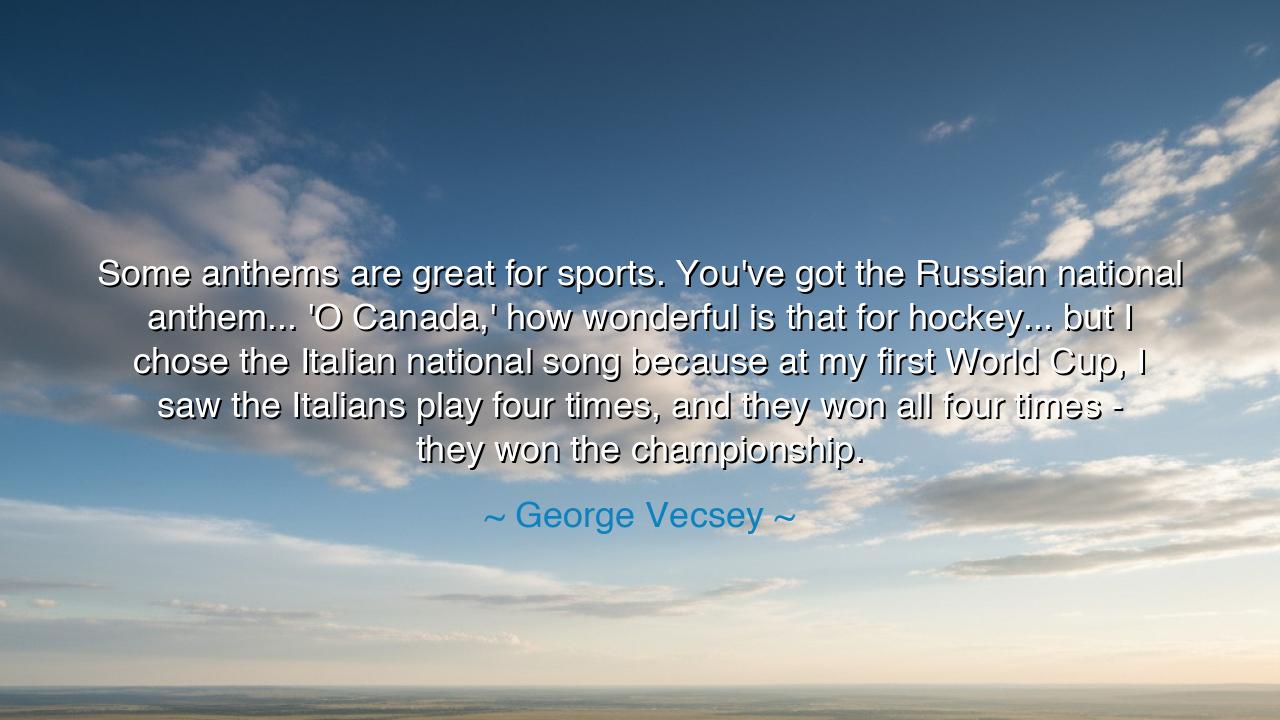
Some anthems are great for sports. You've got the Russian
Some anthems are great for sports. You've got the Russian national anthem... 'O Canada,' how wonderful is that for hockey... but I chose the Italian national song because at my first World Cup, I saw the Italians play four times, and they won all four times - they won the championship.






Hear, O children of memory and song, the words of George Vecsey, who declared: “Some anthems are great for sports. You’ve got the Russian national anthem… ‘O Canada,’ how wonderful is that for hockey… but I chose the Italian national song because at my first World Cup, I saw the Italians play four times, and they won all four times—they won the championship.” Though these words speak of music and games, their meaning reaches beyond stadiums into the realm of identity, spirit, and destiny. For in the anthem, a nation sings not only to itself but to the world, and in sport that song becomes a banner of unity, pride, and triumph.
The anthem is more than melody; it is the soul of a people condensed into sound. The Russian anthem, heavy and solemn, carries the weight of endurance, of sacrifice, of a nation tested by winters and wars. “O Canada,” gentle yet resolute, flows like the ice upon which its hockey heroes skate, reminding all who hear it of loyalty and home. But for Vecsey, it was the Italian anthem—“Il Canto degli Italiani”—that captured his spirit, for he saw it sung not in vain but in victory, tied to the living memory of the 1982 World Cup, when Italy lifted the trophy and all the world beheld their triumph.
The origin of his choice was not merely the music itself, but the experience of witnessing glory. For to see a nation rise four times, each victory stronger than the last, is to have the song itself seared into one’s memory. The anthem becomes not only notes and words, but a vessel of lived emotion—of roaring crowds, of tears streaming down painted faces, of players standing shoulder to shoulder with pride unbroken. Thus Vecsey’s love for the Italian anthem was born not from theory but from lived history: he tied song to victory, and in so doing revealed how anthems become eternal.
This truth is ancient. Recall the warriors of Greece, who sang the paean before battle to honor Apollo, or the legions of Rome, who marched with chants that made their shields resound like thunder. Music in such moments is not decoration but weapon, sharpening resolve and binding many hearts into one. In the modern age, sport has inherited this tradition: the anthem before the match is a ritual as sacred as the prayer before battle. It transforms athletes into champions, spectators into citizens, and victory into a matter of national soul.
The story of Italy in 1982, victorious in the World Cup, is proof of this ancient rhythm. Each time the anthem rang, the players rose higher, the crowds swelled louder, and the victories came one by one until the final triumph. In Vecsey’s memory, that anthem became more than Italy’s song—it became a hymn of destiny, a chant of champions. Just as Homer sang of Achilles, so too do nations sing through their anthems, and in sport those songs are written into history.
But hear also the lesson within: it is not the anthem itself that gives power, but the meaning we attach to it. For one man, “Il Canto degli Italiani” is the song of victory; for another, it may be “O Canada” upon the ice, or “La Marseillaise” roaring in the French night, or any hymn tied to the moment when triumph was seized. The anthem is a vessel, and we ourselves pour into it the spirit of our memories, our struggles, our glories.
Therefore, O listeners of tomorrow, take this truth with you: honor the songs that move your soul, for they are more than music—they are memory, they are courage, they are identity. Sing not only with your lips but with your heart. Whether on the field of play, in the struggles of life, or in the silent battles of the spirit, let your chosen anthem remind you of triumphs past and victories yet to come. For as Vecsey declared, it is in the anthem, sung in unity, that the greatness of a people is revealed.
So let the words endure: an anthem is not only sound, but spirit. And when tied to victory, it becomes immortal.






AAdministratorAdministrator
Welcome, honored guests. Please leave a comment, we will respond soon